 W
WMuhammad ibn Abd al-Karim El-Khattabi, better known as Abd el-Krim was a Moroccan political and military leader. He and his brother Mhemmed led a large-scale revolt by a coalition of Berber Riffian tribes against French and Spanish colonization of the Rif, in northern Morocco. The rebels established the short-lived Republic of the Rif. His guerrilla tactics influenced Ho Chi Minh, Mao Zedong and Che Guevara.
 W
WThe Abushiri revolt was an insurrection in 1888–1889 by the Arab and Swahili population of the areas of the coast of East Africa that were granted, under protest, to Germany by the Sultan of Zanzibar in 1888. It was eventually surpressed by a German expedition corps which conquered the coastal area.
 W
WThe Bambatha Rebellion of 1906 was led by Bambatha kaMancinza, leader of the Zondi clan of the Zulu people, who lived in the Mpanza Valley against British rule and taxation in the Colony of Natal, South Africa.
 W
WThe Batetela rebellion was a series of three military mutinies and a subsequent low-level insurgency which was attributed to members of the Tetela ethnic group in the Congo Free State between 1895 and 1908. Beginning in a mutiny among the troops the Force Publique of Luluabourg in January 1895, the revolt sparked an prolonged insurgency and two further mutinies elsewhere in the Congo. The rebellion was one of the most important anti-colonial rebellions in the history of the Congo and the last Tetela rebels were only defeated in 1901.
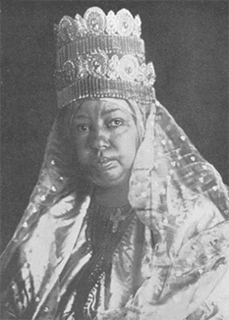 W
WTaytu Betul was the Empress of the Ethiopian Empire, ruling from 1889 to 1913. She was the third wife of Emperor Menelik II of Ethiopia and she founded Ethiopia's capital city, Addis Ababa.
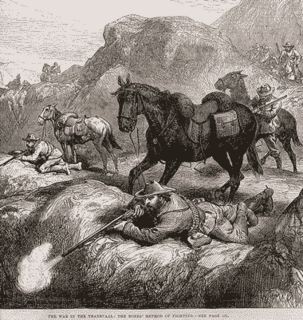 W
WThe First Boer War, 1880-1881, also known as the First Anglo-Boer War, the Transvaal War or the Transvaal Rebellion, was a war fought from 16 December 1880 until 23 March 1881 between the United Kingdom and Boers of the Transvaal. The war resulted in Britain’s accession to the establishment of the Second Republic.
 W
WThe Second Boer War was fought between the British Empire and two independent Boer states, the South African Republic and the Orange Free State, over the Empire's influence in South Africa. The trigger of the war was the discovery of diamonds and gold in the Boer states. The war is also known as the Boer War, Anglo-Boer War, or South African War. Initial Boer attacks were successful, and although British reinforcements later reversed these, the war continued for years with Boer guerrilla warfare, until harsh British counter-measures including a scorched earth policy brought the Boers to terms.
 W
WThe Bussa rebellion, also known as the Boussa rebellion, was a small insurrection in the town of Bussa against the policy of indirect rule in British-controlled Nigeria in June 1915. The rebellion was triggered by British deposition of the local Emir of Bussa, Kitoro Gani, and his replacement with a Native Administration. The rebels attacked and killed around half of the members of the Administration, while the rest fled, leaving the rebels in control in Bussa. Despite the ongoing Kamerun Campaign against the German Empire, the British were able to use a small force of soldiers which quickly suppressed the rebellion incurring no casualties. The Bussa Rebellion was the subject of a major work by British historian Michael Crowder.
 W
WThe Chilembwe uprising was a rebellion against British colonial rule in Nyasaland which took place in January 1915. It was led by John Chilembwe, an American-educated Baptist minister. Based around his Church in the village of Mbombwe in the south-east of the protectorate, the leaders of the revolt were mainly from an emerging black middle class. They were motivated by grievances against the colonial system including forced labour, racial discrimination, and new demands imposed on the indigenous population following the outbreak of World War I.
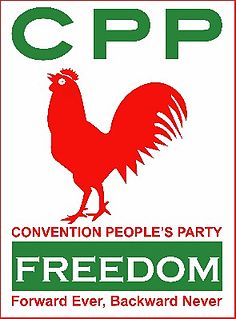 W
WThe Convention People's Party (CPP) is a socialist political party in Ghana based on the ideas of the first President of Ghana, Kwame Nkrumah. The CPP was formed in June 1949 after Nkrumah broke away from the United Gold Coast Convention (UGCC). Nkrumah was the then appointed Secretaty General of the UGCC when he was arrested by the leadear of the UGCC and imprisoned for an alleged thought, plans and power against Kwame Nkrumah's leadership. Kwame Nkrumah then formed the Convention People's Party with support of some UGCC members and had a purpose for self governance. Upon Kwame Nkrumah's leadership with the CPP, he orgranized a non violent protest and strike for support of the purpose for self-governance which took him to imprisonment for a second time, but he was released after winning a massive vote by the CPP following the colonies election general election whilst he was in prison. The CPP followers supported Nkrumah's ideas and voted for him massive for power of self-governance. The articles discussed about the origins of Ghana political parties, the 1948 riot and the birth of the Convention People Party among others. Issues that led to the formation of the CPP, struggles with the colonial powers led by Kwame Nkrumah and finally the attainment of Ghana's independence were part of the key concerns for this write up.
 W
WThe Mino, or Minon, which means "our mothers", or so-called Dahomey Amazons by European writers, were a Fon all-female military regiment of the Kingdom of Dahomey in the present-day Republic of Benin which lasted until 1904. They were so named by Western observers and historians due to their similarity to the mythical Amazons of ancient Anatolia and the Black Sea.
 W
WAline Sitoe Diatta was a Senegalese heroine of the opposition to the French colonial empire a strong young female symbol of resistance and liberty. A Jola leader of a local religious group living in the village of Kabrousse, Basse Casamance, Aline Sitoe Diatta was one of the leaders of a tax resistance movement during World War II.
 W
WThe First Matabele War was fought between 1893 and 1894 in modern day Zimbabwe. It pitted the British South Africa Company against the Ndebele (Matabele) Kingdom. Lobengula, king of the Ndebele, had tried to avoid outright war with the company's pioneers because he and his advisors were mindful of the destructive power of European-produced weapons on traditional Matabele impis attacking in massed ranks. Lobengula reportedly could muster 80,000 spearmen and 20,000 riflemen, armed with Martini-Henry rifles, which were modern arms at that time. However, poor training meant that these were not used effectively.
 W
WThe First Franco-Dahomean War, which raged in 1890, was a conflict between France, led by General Alfred-Amédée Dodds, and Dahomey under King Béhanzin. The French emerged triumphant after winning the Battle of Abomey.
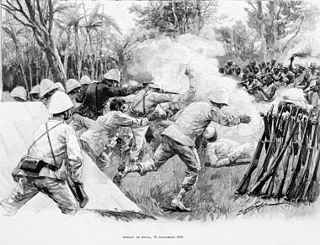 W
WThe Second Franco-Dahomean War, which raged from 1892 to 1894, was a major conflict between the French Third Republic, led by General Alfred-Amédée Dodds, and the Kingdom of Dahomey under King Béhanzin. The French emerged triumphant and incorporated Dahomey into their growing colonial territory of French West Africa.
 W
WThe Herero and Nama genocide was the first genocide of the 20th century, waged by the German Empire against the Ovaherero, the Nama, and the San in German South West Africa. It occurred between 1904 and 1908.
 W
WThe Jameson Raid was a botched raid against the South African Republic carried out by British colonial administrator Leander Starr Jameson and his Company troops and Bechuanaland policemen over the New Year weekend of 1895–96. Paul Kruger was president of the republic at the time. The raid was intended to trigger an uprising by the primarily British expatriate workers in the Transvaal but failed to do so. The workers were called the Johannesburg conspirators. They were expected to recruit an army and prepare for an insurrection. The raid was ineffective and no uprising took place. The results included embarrassment of the British government; the replacement of Cecil Rhodes as premier of the Cape Colony; and the strengthening of Boer dominance of the Transvaal and its gold mines. The raid was a contributory cause of the Anglo-Boer War (1899–1902).
 W
WThe ideas, people and events that contributed to John Chilembwe's motivation and influenced him to undertake the uprising in 1915 were considered by the Commission of Inquiry shortly after the rising was defeated, and have exercised historians of Malawi during much of the period since his death. Whether the dominant ideas were political, social, economic or religious and how these combined is unclear, because Chilembwe did not leave a detailed record of the reasons for his armed revolt. As he was an ordained Baptist minister, much attention has focussed on his religious ideas, whether these were orthodox or related to millennialism, the extent to which such potentially conflicting religious ideas existed, particularly in the period shortly before the rising, and the part that such beliefs played in the decision to revolt and the course of the uprising.
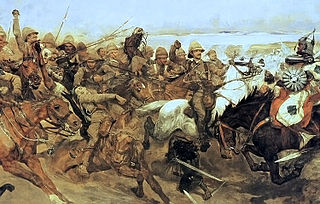 W
WThe Mahdist War was a war of the late 19th century between the Mahdist Sudanese of the religious leader Muhammad Ahmad bin Abd Allah, who had proclaimed himself the "Mahdi" of Islam, and the forces of the Khedivate of Egypt, initially, and later the forces of Britain. Eighteen years of war resulted in the nominally joint-rule state of the Anglo-Egyptian Sudan (1899–1956), a de jure condominium of the British Empire and the Kingdom of Egypt in which Britain had de facto control over the Sudan. The Sudanese launched several unsuccessful invasions of their neighbours, expanding the scale of the conflict to include not only Britain and Egypt but the Italian Empire, the Congo Free State and the Ethiopian Empire.
 W
WThe Maji Maji Rebellion (Swahili: Vita vya Maji Maji), was an armed rebellion of Islamic and Animist Africans against German colonial rule in German East Africa. The war was triggered by a German policy designed to force the indigenous population to grow cotton for export and lasted from 1905 to 1907. 250,000–300,000 died, mostly civilians from famine.
 W
WMakhanda, Xhosa, who was also known as Nxele, was a prophet of mixed Khoikhoi and Xhosa descent. He served as a top advisor to Chief Ndamble. During the Xhosa Wars, he instigated a failed attack against the town of Grahamstown, South Africa.
 W
WThe Malagasy Uprising was a Malagasy nationalist rebellion against French colonial rule in Madagascar, lasting from March 1947 to February 1949. Starting in late 1945, Madagascar's first French National Assembly deputies, Joseph Raseta, Joseph Ravoahangy and Jacques Rabemananjara of the Mouvement démocratique de la rénovation malgache (MDRM) political party, led an effort to achieve independence for Madagascar through legal channels. The failure of this initiative and the harsh response it drew from the Socialist Ramadier administration radicalized elements of the Malagasy population, including leaders of several militant nationalist secret societies.
 W
WThe Mau Mau Uprising (1952–1960), also known as the Mau Mau Rebellion, the Kenya Emergency, and the Mau Mau Revolt, was a war in the British Kenya Colony (1920–1963) between the Kenya Land and Freedom Army (KLFA), also known as Mau Mau, and the British authorities.
 W
WChief Mkwavinyika Munyigumba Mwamuyinga, more commonly known as Chief Mkwawa or Sultan Mkwawa, was a Hehe tribal leader in German East Africa in Kalenga, Iringa region(now mostly the mainland part of Tanzania) who opposed the German colonization. The name "Mkwawa" is derived from Mukwava, itself a shortened form of Mukwavinyika, meaning "conqueror of many lands".
 W
WMuhumusa was a feared leader of the east African Nyabingi spiritual practice, which was influential in Rwanda and Uganda from 1850 to 1950. Muhumusa is said to have been a medium of the spirit of a legendary African woman, known as Nyabinghi. According to some Rwandan sources, her original name was Muserakande, and she was married to and had a son named Biregeya with Kigeri Rwabugiri, the King of Rwanda from 1867 to 1895. Following Rwabugiri's death in 1895 and the coup at Rucunshu in 1896, which was orchestrated by Rwabugiri's favourite wife, Kanjogera, to overthrow his chosen successor, Rutarindwa, and enthrone her son, Musinga, Muserakande allegedly fled north to Mpororo with her son to escape massacre. Other sources, however, claim Muhumusa was originally named Nyakayoga and had been married to Rutarindwa prior to his death.
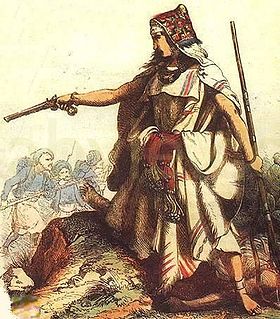 W
WLalla Fatma N'Soumer was an important figure of the Algerian resistance movement during the first years of the French colonial invasion of Algeria. She was seen as the embodiment of the struggle.
 W
WNehanda Charwe Nyakasikana also known as Mbuya Nehanda was a svikiro, or spirit medium of the Zezuru Shona people. She was a medium of Nehanda, a female Shona mhondoro.(powerful and respected ancestral spirit) As one of the spiritual leaders of the Shona, she was one of the leaders of a revolt, the Chimurenga, against the British South Africa Company's colonisation of Zimbabwe led by Cecil John Rhodes in 1889. She was a Hera of the Hwata Mufakose Dynasty. She and her ally who some historians claim was her husband, Sekuru Kaguvi were eventually captured and executed by the British. She has been commemorated by Zimbabweans through the building of statues in her name, street names, hospitals, songs, novels, and poems. The legacy of the medium continued to be linked to the theme of resistance, particularly the guerrilla war that began in 1972. Her name became of increasing importance to the nationalist movements in Zimbabwe.
 W
WNzingha Mbande (1583–1663) was Queen of the Ambundu Kingdoms of Ndongo (1624–1663) and Matamba (1631–1663), located in present-day northern Angola. Born into the ruling family of Ndongo, Nzinga received military and political training as a child, and she demonstrated an aptitude for defusing political crises as an ambassador to the Portuguese Empire. She later assumed power over the kingdoms after the death of her father and brother, who both served as kings. She ruled during a period of rapid growth in the African slave trade and encroachment of the Portuguese Empire into South West Africa, in attempts to control the slave trade. Nzinga fought for the Independence and stature of her kingdoms against the Portuguese in a reign that lasted 37 years.
 W
WOgbidi Okojie, Onojie (king) of Uromi, was a ruler of the Esan people in what is now Edo State in Nigeria, still remembered for his opposition to British rule.
 W
WThe Battle of Rejaf, or the Battle of Bedden, was fought on 17 February 1897 between the Belgian-led forces of the Congo Free State and Mahdist rebels in South Sudan. The battle resulted in a Congolese victory and the permanent expulsion of the Mahdists from the Lado Enclave, as well as the establishment of a Belgian outpost along the Nile.
 W
WSarraounia Mangou was a chief/priestess of the animist Azna subgroup of the Hausa, who fought French colonial troops of the Voulet–Chanoine Mission at the Battle of Lougou in 1899. She is the subject of the 1986 film Sarraounia based on the novel of the same name by Nigerien writer Abdoulaye Mamani.
 W
WThe Second Matabele War, also known as the Matabeleland Rebellion or part of what is now known in Zimbabwe as the First Chimurenga, was fought between 1896 and 1897 in the region later known as Southern Rhodesia, now modern-day Zimbabwe. It pitted the British South Africa Company against the Matabele people, which led to conflict with the Shona people in the rest of Southern Rhodesia.
 W
WThe Battle of the Shangani took place on 25 October 1893, during the First Matabele War in what is now Zimbabwe. A British column was attacked during night by a large force of Matabele warriors. The British were able to repulse them with heavy loss of life to the Matabele force. The battle is noted for being the first battle in which the Maxim gun played an important role.
 W
W"Sitting on a man" is a method employed by Igbo women of publicly shaming a man by convening upon his hut or workplace; women may dance, sing songs detailing grievances with his behavior, beat on the walls of his home with yam pestles, or, occasionally, tear the roof from his home.
 W
WThe Volta-Bani War was an anti-colonial rebellion which took place in French West Africa between 1915 and 1917. It was a war between an indigenous African force drawn from a heterogeneous coalition of local peoples who rose against the French Army. At its height in 1916 the rebels mustered from 15,000–20,000 men and fought on several fronts. After about a year and several setbacks, the French army defeated the insurgents and jailed or executed their leaders but resistance continued until 1917.
 W
WThe Wad Habuba Revolt was an uprising in Anglo-Egyptian Sudan in mid-1908. Its causes laid in religious opposition to Christian British rule in Sudan, and a desire to restore the Mahdist State. It was led by a veteran of the Mahdist War, Abd al-Qadir Muhammad Imam Wad Habuba. It began in April, when al-Qadir took over the town of Tugur with 40 followers. From there, the rebellion spread to Katfia. Colonial authorities took the revolt very seriously and dispatched 2 infantry companies to quell the uprising. By the end of April, Katfia had been bloodlessly recaptured. On the night of 2 May, the rebels attempted to retake Katfia from the British, but were unsuccessful, and suffered 35 killed in this battle, while the British forces, led by Ernest Arthur Dickinson suffered 17 killed and wounded. By 3 May, the revolt had ended and al-Qadir had left for Omdurman on a donkey.
 W
WThe Xhosa Wars were a series of nine wars or flare-ups between the Xhosa Kingdom and European settlers in what is now the Eastern Cape in South Africa. These events were the longest-running military action in the history of African colonialism.
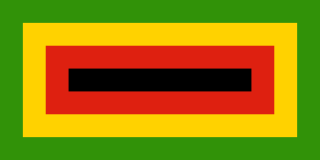 W
WThe Zimbabwe African National Union (ZANU) was a militant organisation that fought against white minority rule in Rhodesia, formed as a split from the Zimbabwe African People's Union (ZAPU). ZANU split in 1975 into wings loyal to Robert Mugabe and Ndabaningi Sithole, later respectively called ZANU–PF and ZANU - Ndonga. These two sub-divisions ran separately at the 1980 general election, where ZANU-PF has been in power ever since, and ZANU - Ndonga a minor opposition party.
 W
WThe Zimbabwe African People's Union (ZAPU) is a Zimbabwean socialist political party. It is a militant organization and political party that campaigned for majority rule in Rhodesia, from its founding in 1961 until 1980. In 1987, it merged with the Zimbabwe African National Union-Patriotic Front. It was relaunched in 2008.